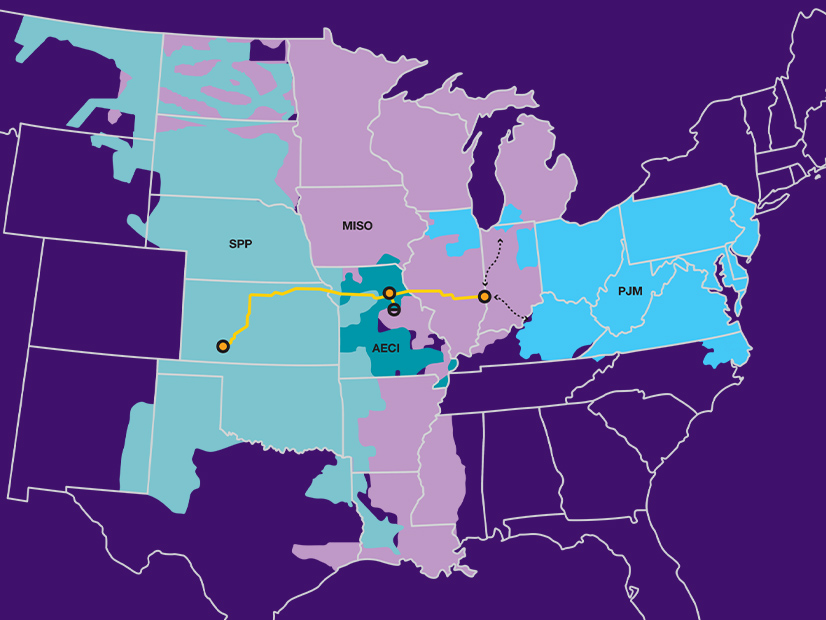
Invenergy asked FERC on Nov. 7 to order MISO to allow it to energize part of its Grain Belt Express project in 2028 despite delays in upgrades needed in Ameren’s territory (EL24-35).
The approximately 800-mile, 600-kV high-voltage direct current transmission line will have the capacity to deliver up to 5,000 MW of renewable generation from Western Kansas to the Midwest and PJM.
Grain Belt Express (GBX) asked the commission to add a limited operation provision to Attachment GGG of MISO’s Open Access Transmission, Energy and Operating Reserve Markets Tariff.
Invenergy said it will be able to put Phase I of its project into operation in 2028 because it has obtained siting permits in all four states on its route and has nearly completed right-of-way acquisition.
However, on Sept. 15, MISO informed GBX that it was delaying the in-service date from Dec. 1, 2027, to Dec. 1, 2030, because two network upgrades Ameren will build require regulatory permits, extending the time for their completion.
GBX said it asked MISO to incorporate into its transmission construction agreement (TCA) an option for limited operations “comparable to the limited service options included in the commission’s pro forma large generator interconnection agreement (LGIA) for generator interconnections, and which some RTOs have explicitly expanded to merchant transmission.”
GBX said MISO rejected its proposal because it is not a provision in its current tariff. The RTO told GBX it would add the proposal to a list of issues to be discussed with stakeholders but that “it would not be something pursued in the near term as it is working through other pending initiatives, including completion of its Order No. 2023 compliance requirements … activities that can be expected to extend throughout 2024 and likely 2025 as well.”
GBX said that meant “by the time it finishes its pending initiatives, starts stakeholder proceedings, develops a tariff proposal, and then files it with and obtains commission acceptance, it will likely be close to or past GBX’s planned 2028 operations date.”
“As such, MISO’s promise to look into this at a later date may not result simply in a delay, but in practical terms, a denial of limited operation. It is important that GBX have certainty as it is lining up customer commitments and moving forward on obtaining financing, and that the potential for limited operation prior to 2030 be managed now.”
GBX said it will also ask FERC to modify the TCA, which MISO is expected to file unexecuted this month.
MISO did not immediately respond to a request for comment.
Limited Operation
Phase I of GBX will interconnect its Kansas converter station with a converter station in Monroe County, Mo. A 40-mile AC tie-line will connect that station to the MISO system along an Ameren Missouri 345-kV AC transmission line connecting the McCredie substation and the Montgomery substation and interconnecting with the Associated Electric Cooperative Inc. system at the McCredie 345-kV substation.
GBX said MISO should modify the TCA to allow limited operation of the project without the Ameren upgrades for whatever lower amount of capacity could be connected and injected prior to the upgrades’ completion.
It cited FERC’s pro forma LGIA, which says that, if upgrades are not expected to be completed prior to the commercial operating date of a generating facility, the transmission owner will perform studies to determine the extent to which a customer may operate prior to the completion of those upgrades.
GBX said it has commissioned studies “which, on a preliminary basis, are indicating that there should be some potential for operating at less than full capacity prior to the completion of the two Ameren lines.”
Invenergy said FERC’s “policy of providing a limited operation option to generator interconnection customers applies equally to MHVDC connection customers.”
It said PJM has merged its procedures for all types of new service requests, including merchant transmission interconnection, and explicitly permits limited operation of merchant transmission facilities if there is a gap period between the completion of the transmission and network upgrades.
“MISO’s rejection of GBX’s request for limited operation while it awaits completion of network upgrades for three years after the GBX facilities are completed is unreasonable given the urgent need for transmission in the U.S. and the harm to GBX,” it said.
It said the delay would require it to carry the financing cost of its projects for an additional three years before beginning service to paying customers.
It asked FERC for an expedited order by March 15, 2024.

Nicely explained. Thanks for covering this.